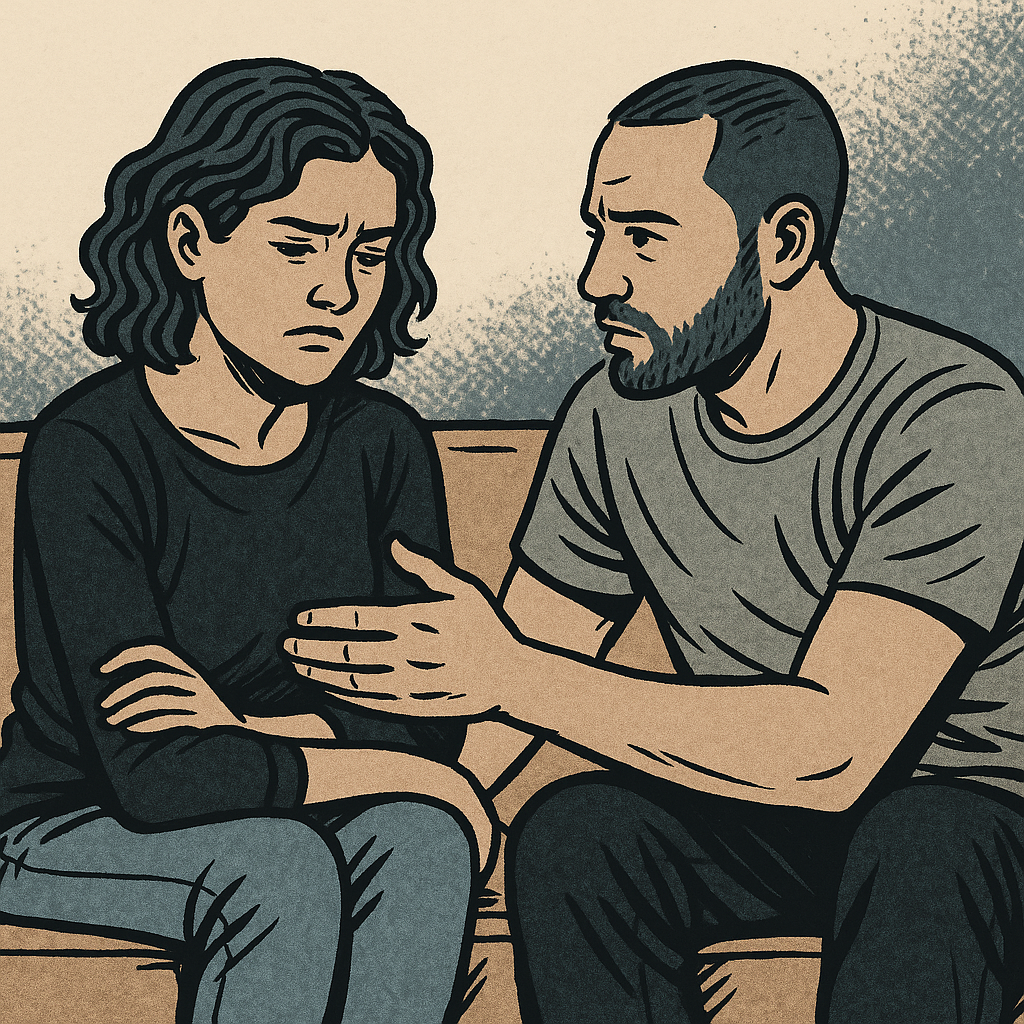Understanding what healing takes—and how not to do it alone
It can feel like the floor has dropped out from under you.
You discover something—a message, an affair, a lie, a pattern that’s finally come into view—and suddenly the relationship you thought you had… changes. It’s not just about what happened. It’s about the ripple of doubt that spreads through everything else: Was any of it real? Can I ever trust them again? Can we come back from this?
If you’re asking those questions, know this: you’re not alone. And asking them doesn’t mean your relationship is doomed. It means you’re human. It means something mattered to you deeply—and that something has been damaged.
Betrayal, in all its forms, cuts to the core of connection. But that doesn’t automatically mean the connection is lost forever. The bigger question is: What now?
What Counts as Betrayal? (It’s Not Just Affairs)
Betrayal doesn’t always come with headlines or scandal. Sometimes it’s emotional intimacy with someone outside the relationship. Sometimes it’s secrets about money, addiction, or even parenting choices. Sometimes it’s chronic avoidance or breaking of promises that were supposed to matter.
It could look like:
- A partner reconnecting with an ex and keeping it hidden
- A slow buildup of lies around spending or gambling
- A series of broken agreements—like saying “I’ll stop drinking” and not following through
- Emotional abandonment during a major life event.
Whatever form it takes, betrayal sends the same message to the wounded partner:
“I wasn’t safe. Or chosen. I wasn’t considered.”
And to the partner who caused harm, the message may become:
“I’m unforgivable. Nothing I do will ever be enough now.”
A Relationship on the Edge
Imagine this scenario. A couple has been together for over a decade. They’ve raised children together, built a life, but also fallen into emotional distance over the years. One partner ends up having an affair—not because they didn’t care, but because they felt numb, lonely, unseen. The other partner finds out and is shattered.
This is often where couples call it quits. But it’s also where some choose to begin again—differently.
Weekly counselling can help rebuild slowly, with space to feel, process, and learn new ways of connecting. For couples who want a deeper, focused start—intensive sessions (often 4 to 8 hours, sometimes over multiple days) provide the structure and momentum to begin that process in a more immersive way.
But whichever format you choose, healing isn’t about “getting back to normal.” It’s about creating something new from the truth of what’s happened.
What Rebuilding Trust Actually Involves
Rebuilding trust after betrayal is not about forgetting. And it’s not about one person doing all the work.
Instead, it’s a layered process—one that involves both partners showing up in ways that may be unfamiliar, vulnerable, and sometimes uncomfortable.
It often includes:
- Slowing the story down: Both partners need time to feel, speak, and be heard.
- Understanding the “why”—without excusing it: What led to the rupture? What was the emotional landscape before it happened?
- Establishing new boundaries and agreements: Not just promises to “never do it again”, but a shared understanding of what emotional safety will now require.
- Consistent accountability: The partner who caused harm must be willing to show up over time, even when it’s hard—and even when forgiveness hasn’t been granted yet.
- Grieving the old relationship: Yes, grief. Because something ended. And what begins next needs space to grow differently.
This work isn’t always linear. There are good days, hopeful conversations, and sometimes moments that feel like setbacks. But therapy offers something the couple can’t always create on their own: a space that holds both partners, without blame or avoidance, and makes room for honest repair.
Should You Try to Rebuild—or Walk Away?
That’s a question only you can answer. And it’s not one you need to answer immediately.
What we often say in therapy is: Don’t make permanent decisions while you’re still swimming in pain. That doesn’t mean ignoring reality or giving your partner a free pass. It means giving yourself room to understand what you want, what you need, and whether you believe healing is possible—with the right effort and support.
Sometimes, the person who caused harm wants to move forward quickly—to “fix it” and forget it. But rushing repair almost always backfires. And the person who was hurt may feel guilty for not being “ready” to forgive. But forgiveness (if it comes at all) isn’t a starting point—it’s often a byproduct of real healing.
Intensive or Weekly: Which Is Right for You?
Some couples need time to sit with the pain in small doses. Weekly sessions provide a consistent space to begin exploring, processing, and gradually reconnecting.
Others feel like weekly sessions aren’t enough—especially when the hurt is fresh or the stakes are high. That’s where intensive sessions come in. These can range from 3 to 8 hours at a time (or longer), depending on how deep the couple wants to go and what feels tolerable emotionally. Some couples do back-to-back days; others begin with an intensive and return for shorter follow-ups to help integrate and stabilise the work.
These aren’t “quick fix” sessions. They’re designed to give the relationship the time it needs—not to rush healing, but to create the space for real honesty, clarity, and movement forward.
You’re Not Broken—You’re at a Crossroad
If you’re facing betrayal, you’re likely feeling a mix of heartbreak, confusion, anger, grief, and maybe even longing. That doesn’t mean you’re weak. It means you’re facing something that shakes people to their core.
But what you choose to do next… matters.
This can be a turning point. Whether you stay together or eventually choose separate paths, therapy can help ensure the process is less destructive and more conscious. That you leave this experience understanding more—not just about what happened, but about what you truly want from love, honesty, and connection. And establishing an amicable relationship can also make divorce less expensive if you decide to take that path.
Ready to Begin Again—In a New Way?
If you’re sitting in the aftermath of betrayal, feeling overwhelmed and uncertain, know that you don’t have to do this alone.
You’re welcome to reach out—whether you prefer the steady rhythm of weekly support or an intensive deep-dive that gives you the space to truly begin.
This isn’t about going back. It’s about building something more honest, more connected, and more aligned with the relationship you both want to live in moving forward.

